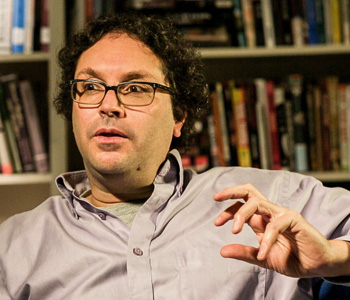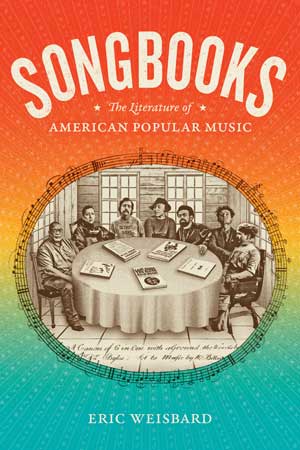
Songbooks is a book about books on American popular music. It’s a vast subject, and my book covers books from a 1770 collection of psalmody by a tanner in revolutionary New England to Jay-Z’s Decoded in 2010. I break the book into pieces, with essays on different authors, artists, and topics carrying the history forward in the order that the book that headlines an entry was published. You might find yourself reading about a blackface minstrel in the 1830s and about Zora Neale Hurston’s pioneering juke joint ethnography Mules and Men in the 1930s; there’s room to consider how Joel Whitburn’s books of chart hits shaped our sense of how to remember pop songs, but also how Jaime and Gilbert Hernandez’s Love and Rockets comic books became the first place to learn about Latinx punk in Southern California. I want people to read it however makes them happy: hopscotching to favorites or checking out a period in time to see how things they didn’t know were connected spoke to each other.
Two major ideas come out of this study. The first, which has to be said loudly now that popular music has been embraced by academia, is that most interesting writing in this field has been by non-academics or decidedly oddball ones. While heaps of books pledge allegiance to a music genre or an academic discipline, dutiful to document the lives and work of musicians, I’m driven by stuff that invents its own form, often writings by women, people of color, outsiders to set fields. The “hooks” in pop songs come from musical mistakes, odd phrasings, unlikely collaborations, the broken amp making funny feedback. So too the most intriguing music books, which come at the subject from a novel angle—including many novels! From Theodore Dreiser through Jennifer Egan’s A Visit from the Goon Squad, they are acute on connections between popular culture and urban desire. Egan knows the tradition and ends with what might be Sister Carrie’s story: “It was another girl, young and new to the city, fiddling with her keys.”
The second key concept is the now centuries-long reckoning with vernacular commercial music as culture. It’s not high art, it’s not folklore. At times it has felt revolutionary. Not so much lately. My groupings are a mini-history. “Setting the Stage” is the Stephen Foster era of sheet music and blackface minstrelsy: the original songbooks were cheap amusements or spiritual collections like Slave Songs of the United States. The Jazz Age came next: urban modernity from F. Scott Fitzgerald to Louis Armstrong, whose first books were transcribed trumpet solos. By mid-century, icons were a staple: Woody Guthrie’s folksy vernacular, Billie Holiday’s beyond-true Lady Sings the Blues, Américo Paredes’s incredible outlaw corridos study, “With His Pistol In His Hand.” The revolutionary part came in the 1960s, via Tom Wolfe and rock critics, but soul countercultures too via Amiri Baraka. When that moment faded, the epic saga of vernacular music was done. But I’m only half-way—the rest of the book tracks how later generations rethought what mattered and why.
I have had two careers and this book meets at their intersection. As a Village Voice and Spin rock critic and editor, I came in at the end of the vernacular epic, as Generation X writers argued grunge and gangsta rap while reviving cheesy old radio tunes. This created a perspective that by the 2000s was called poptimism: the idea that it was almost always a kind of bias—rockism—that made a critic blast commercial music without thinking through issues like race, gender, and class. My second career has been as an academic, investigating these questions more thoroughly, as in my previous book, Top 40 Democracy, on radio formats. In-between, however, I helped bring journalism and academia together through the Pop Conference, an annual gathering that since 2002 has put on display the mix of people that Songbooks now gives a history to. To me, the world shouldn’t divide between people who read critics like Lester Bangs and (my spouse) Ann Powers and people who read academics like José Esteban Muñoz and Lise Waxer. We should all read both, period. That’s the theme of the Pop Conference and the theme of Songbooks. The second half of the book develops those parallels: they’re what replaced the epic perspective once cultural studies and poptimism took over.
I can also note a trio of terms that turned out to mean more to this book than I would have guessed going in. Vernacular: not only how people actually talk, but in music the accent of their style, which in U.S. music often turns on Black style as developed by African Americans, interpreted or lifted by whites, valorized as the essence of jazz, blues, gospel, etc. Sentimental: for too long the apparent opposite of vernacular—genteel, fussy, soft. Notice how gendered this is. Lots of popular music books sought to purge the sentimental in the name of a kind of street sensibility; after the revolution, vernacular approaches sought to make peace, then cultural studies all but eradicated the vernacular! Which created a backlash to the backlash, since explaining away Black vernacular could just be another form of whitesplaining. An answer has come with a third term: literature. Seeing popular music as novelistic rather than epic, the product of artistic choices rather than expressing inherently outlandish identities, has made music books take a different shape. If both the poet Langston Hughes and the blues musician Robert Johnson are seen as urbane writers with strong ties to vernacular music, not different sides of a coin, their books or books about them read differently, which registers in the 21st century in two books that share a lot: poet Kevin Young’s Grey Album, a meditation on Black vernacular masks named after a mash-up of a Beatles and a Jay-Z album, and rapper Jay-Z’s own Decoded, which never presents the hip-hop hustler as anything but a literary invention.
I’d hope that a browsing reader would check out a trio of entries (most are under 1000 words!) and get a sniff of the thing. For example:
Early in the book: Emma Bell Miles, first to write about Americana, which she or Harper’s called “Real American Music” in 1904—Appalachian mountain stuff. Split between the city-bourgeois world she distrusted and Appalachians who distrusted her, she caught gender divides shaping cultural ones: “The woman belongs to the race, to the old people. He is a part of the young nation. His first songs are yodels.” A poem—she scraped to fund a collection; a posthumous one, from 1930, first proved her endurance—contrasted “The Banjo and the Loom”, domesticity and “Possum up a ‘simmon-tree” minstrel scamp. Her story “The Dulcimore”—among those collected in 2016—sketched a mother exiled by love to mountains hardship watching a daughter do the same for a blacksmith who’d made her the lap instrument.
Middle: Mystery Train author Greil Marcus. To invoke a fellow critic, the “Ellen Willis test” was to judge sexism by how a singer’s words resonated when you imagined a woman performing them. The undeclared Greil Marcus test was to take each cultural item, noble or sordid, as it came, and see if the dough leavened, see if the candle kept, unfathomably, burning. Those everlasting flames he collected. Not like most collectors, genre definers. His was a critic’s compendium: songs, film scenes, ad hypes, all sorts of performances that affected him entered in the register and given fitting prose.
Late: poet-philosopher Fred Moten. With Burning Spear’s dub-heavy “do you remember the days of slavery?” filling his head, Moten could connect cultural studies interpellation and vaudeville interpolation, then bluntly demand of black British cultural studies scholar Paul Gilroy, antithetical to U.S. blackness, “Who the fuck you talking to?” Sound to him mattered as “the site of a kind of unruly music that moves in disruptive, improvisational excess … a certain lawless, fugitive theatricality.” The Universal Machine began: “what you have here is a swarm”. But what particulars swarmed. Who except Moten could link philosopher Emmanuel Levinas’s disdain for dancing civilization to Springsteen manager, Jon Landau, hearing indulgence rather than expansiveness in Curtis Mayfield? He didn’t take sides, he took asides.
The great thing about writing a book that starts with a book published in 1770 and ends with a book published in 2010 is that you get to take the long view—time will tell! In the immediate future, I expect to hear about all the errors I made rushing my way through a 2500 or so book bibliography, all the inherent problems in one person trying to vet a huge literature. But if I’m lucky, this book will work in some of the ways that my first one did, the Spin Alternative Record Guide (1995), which managed to insinuate itself into the listening lives of many people over time. Often, what I’m quickly pointing to in these pages are subjects that I still think have some mystery left to them, a question we don’t so much want to fully answer as keep answering.
I am a strange human being in that I love music writing as much as I do music itself, love the quirky, cranky characters it attracts, love the contradictory nature of the enterprise (serious fun), love seeing how far writers of so many different identities can take particular subjects of so many different kinds. It’s more than clear now that popular music has amassed a literature, in the sense of multiple books on multiple topics. What this book is more concerned to promote is literature in the sense of a sentence or paragraph that makes an impression the way a lyric does, because the viewpoint is so singular, because it imparts a resonance.
All these years after the arrival of vernacular pop, we might feel more posthuman than we do like rock and rollers flocking to what the great critical explainer Robert Palmer called “The Church of the Sonic Guitar”. (See my entry on cyberpunk novels!) I accept that, but now we need to work out what comes next—and how that changes our views of the still powerful writing that came before. My hope is that by outlining American popular music’s literary past, and having the time of my life doing it, I can provide some inspiration heading forward.


Eric Weisbard is associate professor of American Studies at the University of Alabama and co-editor of Journal of Popular Music Studies. He founded and for many years organized the Pop Conference, editing its collections This Is Pop, Listen Again, and Pop When the World Falls Apart. Before that, he edited the Village Voice music section, wrote for Spin, and edited its Spin Alternative Record Guide. His other books are Top 40 Democracy: The Rival Mainstreams of American Music and Use Your Illusion I and II.